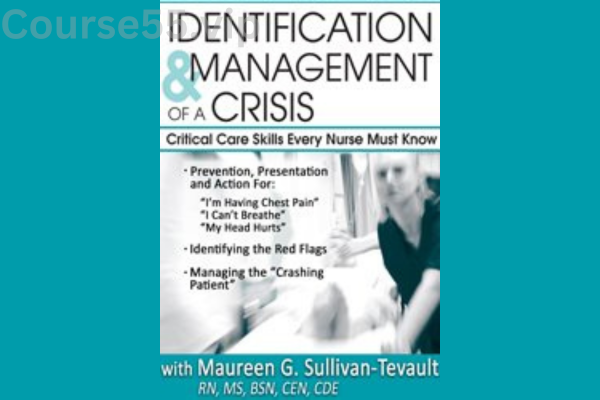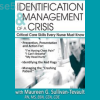Identification & Management of a Crisis: Critical Care Skills Every Nurse Must Know By Sandy Salicco – PESI
$199.00 Original price was: $199.00.$23.10Current price is: $23.10.
Identification & Management of a Crisis: Critical Care Skills Every Nurse Must Know – Digital Download!

Identification & Management of a Crisis: Critical Care Skills Every Nurse Must Know By Sandy Salicco – PESI
Overview

Mastering Crisis Identification and Management for Nurses
As patient acuity levels continue to rise, the responsibilities of nurses have expanded significantly, requiring not just clinical expertise but also exceptional crisis management skills. Sandy Salicco’s seminar, “Identification & Management of a Crisis: Critical Care Skills Every Nurse Must Know,” offers a comprehensive training experience tailored to healthcare professionals, particularly nurses, aiming to enhance their ability to manage emergencies effectively. This seminar covers a range of complex medical situations, including the use of central lines, chest tubes, and ventilators, even in settings like nursing homes or general medical floors. By focusing on rapid assessments and immediate interventions, Salicco’s training ensures that nurses are well-equipped to handle high-pressure scenarios with competence.
The course is designed to hone critical thinking skills, emphasizing the importance of time-sensitive assessments and interventions in life-threatening situations. Since healthcare providers often manage multiple patients in environments where thorough evaluations may not always be feasible, this training becomes a crucial tool. By attending, nurses will gain the skills and confidence to address immediate challenges effectively and calmly.
Core Components of the Course
The seminar begins by stressing the identification of red flags during patient assessments, particularly in crisis situations. Nurses are taught rapid assessment strategies that highlight the need for asking key questions. This foundational knowledge enables timely interventions that can significantly impact patient outcomes. Critical thinking is emphasized throughout, ensuring that nurses take an active role in patient care and become proactive in preventing serious complications. Asking the right questions can be crucial in detecting potential issues before they escalate.
Further, the seminar is structured into modules that focus on various critical medical emergencies commonly encountered by nurses:
Cardiovascular Emergencies
In this segment, nurses will learn to identify arrhythmias and assess stable versus unstable patient conditions. Key practices in the management of acute myocardial infarctions are covered, with an emphasis on tPA protocols and catheterization lab procedures. The early identification of heart attacks is a key focus, as timely intervention can significantly improve patient survival rates.
Respiratory Emergencies
The course also offers guidance on managing respiratory distress. One key area of focus is distinguishing between anxiety-driven symptoms and actual respiratory issues. The use of oxygen therapy, CPAP, or BiPAP machines is covered, alongside the critical decision-making process surrounding intubation. Correctly diagnosing respiratory distress is essential, as errors can lead to increased patient discomfort or complications.
Neurological Emergencies
Neurological management is another crucial part of the training. Nurses will gain expertise in managing conditions like elevated intracranial pressure and differentiating between ischemic and hemorrhagic strokes, including the proper use of tPA. This section is vital, as the ability to conduct thorough neurological assessments can greatly influence patient recovery and long-term health outcomes.
Managing Decompensating Patients
A significant focus of the seminar is the management of decompensating patients in critical conditions like anaphylaxis, sepsis, and shock. Nurses will learn how to act swiftly in recognizing these life-threatening situations, activate rapid response teams, and make quick decisions regarding patient transport. Immediate actions are crucial, as delays can result in irreversible damage. This segment emphasizes when and how to escalate care effectively, a vital skill for saving lives.
By the conclusion of the seminar, attendees will be able to:
-
Implement rapid assessment techniques to address emergencies.
-
Identify early indicators of serious, rapidly progressing conditions.
-
Prioritize nursing interventions in various crisis situations, such as neurological, cardiac, respiratory, and endocrine emergencies.
Flexible Learning Format and Course Features
The seminar is delivered as a full-day event, structured to accommodate the modern healthcare professional’s needs. Classes are available in both audio and video formats, allowing participants to choose the format that best suits their learning preferences. A comprehensive manual, which covers all course materials, is provided for download after purchase. This manual serves as an ongoing reference to support the learning process long after the seminar concludes.
Conclusion
The ability to identify and manage crises is a crucial component of nursing practice, requiring a combination of technical expertise, quick thinking, and decisive action. Sandy Salicco’s seminar provides an invaluable resource for nurses who wish to improve their critical care skills in today’s demanding healthcare environment. By focusing on practical knowledge and essential critical care techniques, this training enables nurses to handle patient emergencies with confidence and professionalism. This course is an indispensable tool for enhancing clinical outcomes and furthering the development of nursing as a discipline committed to patient safety and high-quality care. As healthcare continues to evolve, ongoing education like this will remain essential for all medical professionals.
Frequently Asked Questions:
Business Model Innovation: We operate a group buying strategy, allowing participants to share costs and access popular courses at reduced prices. This model benefits individuals with limited financial resources, despite concerns from content creators about distribution methods.
Legal Considerations: The legality of our operations involves complex issues. Although we don’t have explicit permission from course creators to resell their content, there are no specific resale restrictions stated at the time of purchase. This ambiguity creates an opportunity for us to provide affordable educational resources.
Quality Control: We ensure that all course materials purchased are identical to those offered directly by the creators. However, it’s important to understand that we are not official providers. As such, our offerings do not include:
– Live coaching calls or sessions with the course author.
– Access to exclusive author-controlled groups or portals.
– Membership in private forums.
– Direct email support from the author or their team.
We aim to reduce the cost barrier in education by offering these courses independently, without the premium services available through official channels. We appreciate your understanding of our unique approach.
Be the first to review “Identification & Management of a Crisis: Critical Care Skills Every Nurse Must Know By Sandy Salicco – PESI” Cancel reply
You must be logged in to post a review.

 Understanding the Needs of the Dying: Bringing Hope, Comfort and Love to Life's Final Chapter By David Kessler - PESI
Understanding the Needs of the Dying: Bringing Hope, Comfort and Love to Life's Final Chapter By David Kessler - PESI 














Reviews
There are no reviews yet.